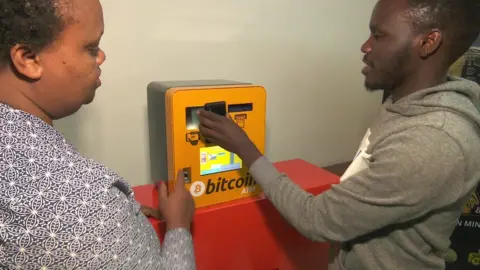Crypto-currencies gaining popularity in Kenya
 BBC
BBCInterest in virtual currencies is rising across the African continent, especially in Kenya, Africa's Silicon Valley.
Despite warnings from Kenya's central bank about the volatility of crypto-currencies, some businesses in Nairobi are now accepting Bitcoin payments.
The total number of Bitcoin transactions in Kenya are estimated to be worth over $1.5m, according to the Blockchain Association of Kenya.
But can the technology really take off?
Crypto-currencies are virtual money that can be used to pay for things in the real world, such as a hotel room, food or even a house.
Digital tokens are held in online wallets, and can be sent anonymously between users.
Crypto-currencies run on a technology called blockchain - a ledger of blocks of information, such as transactions or agreements, that are stored across a network of computers.
The information is stored chronologically and is designed to be de-centralised and tamper-proof.
While this provides security, it also means there is no oversight from a central authority such as a bank or a government.
The first-ever blockchain-backed currency developed was Bitcoin, and it continues to be the most widely-used globally.
At the moment, the crypto-currencies Bitcoin, Dash and Lisk are used in Botswana, Ghana, Kenya, Nigeria, South Africa and Zimbabwe.
Blockchain is also being implemented by start-ups and tech conglomerates alike in Kenya to help solve problems, such as IBM's platform to help small businesses to prove their creditworthiness for loans.
Preventing theft
Tony Mwongera, the chief executive of Healthland Spa in Nairobi, began accepting Bitcoin payments in 2018.
''I decided to adopt the use of crypto-currencies because there was so much theft in my business," he told the BBC.
"So I said, let me use a way that can be safe, secure and I can also embrace technology."
Healthland Spa customers told the BBC that they like the convenience of using crypto-currencies to pay for purchases.
However, if you look at the total number of people in Kenya using virtual currencies today, it is still relatively small - only about 40,000 people have ever made a transaction using Bitcoin.
Part of the reason crypto-currency penetration isn't growing that much is because Kenya's central bank has forbidden banks from dealing in virtual currencies.

Banks are not allowed to open accounts for people who are known to dealing in any virtual currency, which means that the population cannot easily convert Bitcoin payments into cash or mobile money.
"Crypto-currencies can facilitate and ensure that you do an unlimited number of transactions, however the volatility, lack of control and the non-acceptability of crypto-currencies across different jurisdictions impairs what you'd expect a currency to do," economist and policy expert Vincent Kimosop told the BBC.
The Blockchain Association of Kenya (BAK) disagrees with this way of thinking, and it is actively working to educate the country on the benefits of using crypto-currencies and blockchain.
The non-profit body says that using virtual currencies can greatly reduce the cost of transactions, and enable people without bank accounts to quickly make and receive payments.
According to BAK, there are many things Kenyans have realised they can use Bitcoin for - whether it is to pay merchants in China for goods, or to enable Nigerians to pay to send their children to school in Kenya, or to enable young African freelancers to be easily paid for their work online.